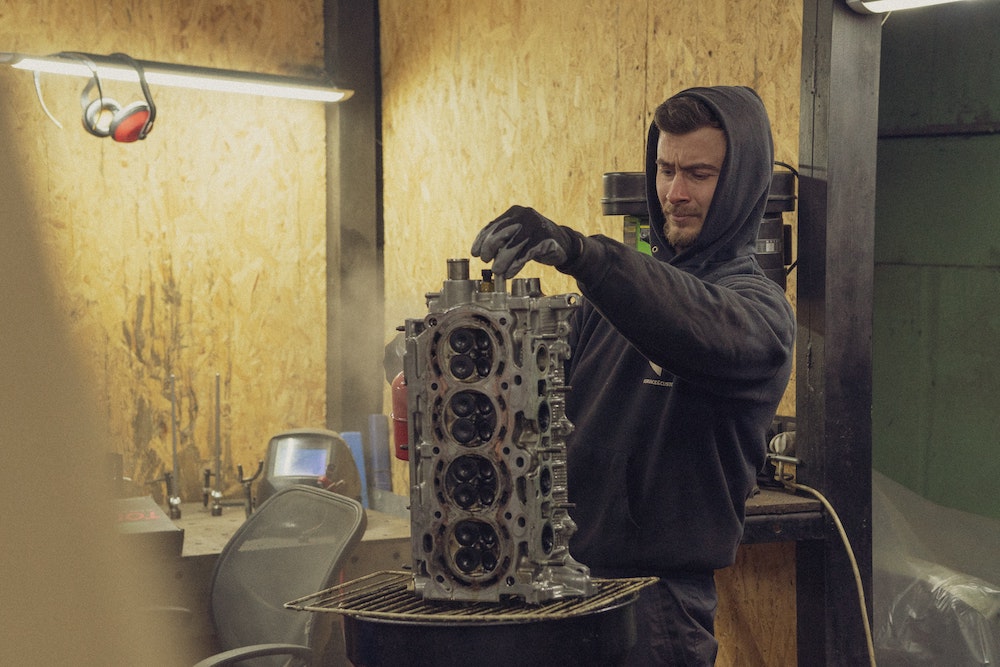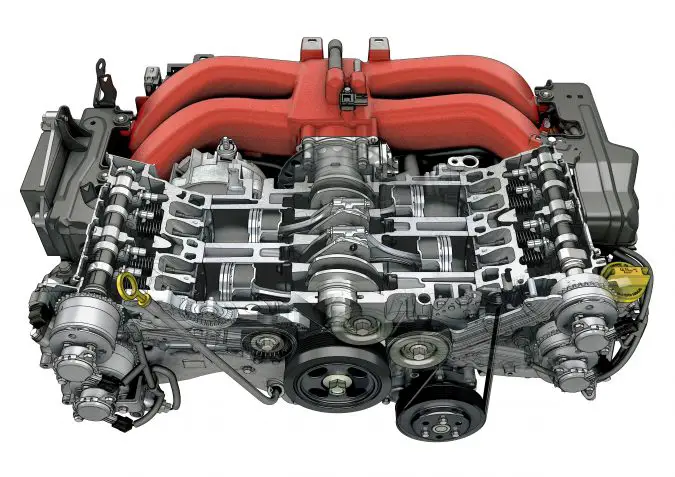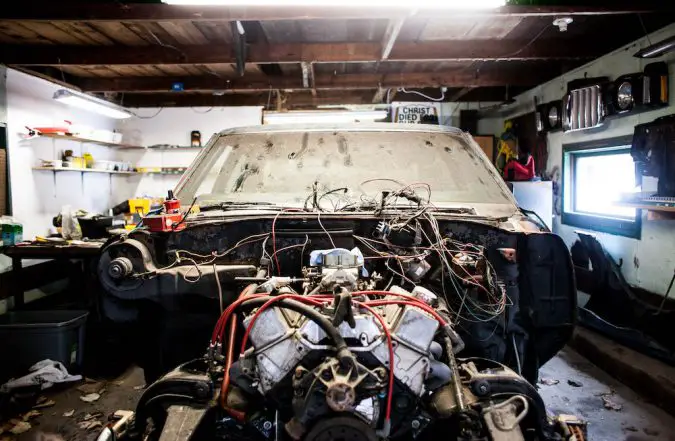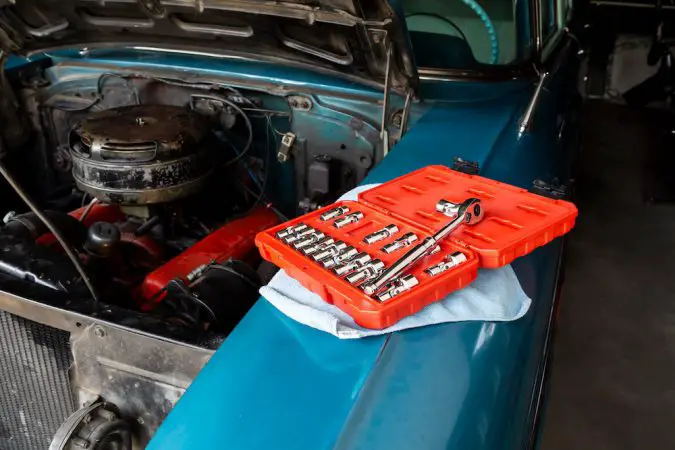At its core, the internal combustion engine hasn’t entirely evolved much over the last century and a half. It’s still the same suck, squeeze, bang, and blow. That’s otherwise a simplified concept of how fuel and air are combusted. However, newer technologies will always appear to make engines that bit more efficient at their job. That’s why you have to worry about piston rings replacement cost.
These piston rings are an integral component of most modern engines. They not only keep your car’s engine running smoothly and potently, but also ensures that it won’t wear itself down over. It’s not a surprise then, that many people are concerned when worn out or compromised piston rings appear. With this in mind, how much does the piston rings replacement cost? Spoiler alert, it isn’t cheap.
- What Are Piston Rings?
- How Do They Work?
- What Do They Do?
- Symptoms
- Costs
- Troubleshooting
- How To Replace
- Conclusion
What Do You Need To Know About Piston Rings?
Before we get into the proverbial piston rings replacement cost, it’s worthwhile taking some time to understand more of what they do. So, just what are piston rings? Well, I’m sure we’re all well versed with what pistons are. They sit snugly within your engine’s cylinders. As fuel and air get compressed inside the combustion chamber and are ignited, this combustion pushes the pistons up and down.
The piston’s motion upwards and downwards is how an explosion can be turned into a force that your car can exploit to move forwards and back. From the pistons, this movement then moves to the crankshaft, and then the transmission, before making its way to rotate your vehicle’s wheels. With this in mind, you also have to comprehend that the pistons have quite a lot of fluids to handle.
On top of the pistons, you have fuel – and air, which is technically a fluid – that are highly pressurized. But beneath the pistons, you have ample quarts of motor oil keeping the whole system lubricated. As we’ll learn more later on, having the fuel and air be mixed in with oil is a big no-no. Moreover, we have exhaust gases to worry about, which are generated after the fuel and air have ignited.
So, how does the piston keep these fluids separated? That’s where our friends, the piston rings, come along. For every cylinder of your engine, it doesn’t matter if it’s an inline-4 or a V12, each piston has piston rings. This series of spring-loaded metal rings cover the gaps between the moving pistons and the stationary cylinder walls. In essence, these rings keep these fluids apart.
How Do These Piston Rings Work?
To be more specific – and it’ll be relevant to learn this as we go along piston rings replacement cost – there are three rings. They are inset into their grooves, which go all around the circumference of the pistons. These three rings – although some vehicles may have more of either one – each plays a crucial role:
- Compression Ring – This is the top-most piston ring. As the name suggests, the compressing ring’s duty is to maintain compression and pressure amongst the group of piston rings. It creates the main seal for the piston and prevents the combustion’s aforementioned fluids – this being fuel, air, and exhaust fumes – from getting past it.
- Wiper Ring – It’s found wedged between the compression ring, and the bottom-most oil control ring. The wiper ring, as per its namesake, has two tasks. The first is reinforcing the compression ring in keeping a hardy seal. Any combustion gases that may leak through the compression ring are stopped here. On top of that, it has to wipe and clean excess motor oil off the cylinder walls.
- Oil Ring – Also referred to as O-Rings or oil control rings, they’re the bottom-most piston rings. The pistons need motor oil for lubrication. However, any oil that leaks into the combustion chamber isn’t ideal. It’ll get burnt, which only increases wear on the engine and heightens oil consumption. The oil rings ensure that motor oil is sealed at the bottom of the pistons, in the crankcase.
What Do Your Engine’s Piston Rings Do?
As we’ll guide you about piston rings replacement cost, it pops into mind what they actually do in the first place. So, by keeping your engine’s many fluids at bay, what do your piston rings do? In addition to what we’ve explained already, there are four distinct functions that your piston rings are responsible for. Thus, we’ll better get to grips surrounding their importance:
- Its main role is to seal the pistons. Mainly, this is to prevent the gases – a by-product of the engine’s combustion – from escaping the combustion chamber. Eventually, this will end up in the crankcase. If these gases leak out of the cylinders, it could reduce your car’s overall performance.
- By keeping oil out of the combustion chamber, there are numerous benefits. Namely, it helps to keep motor oil from burning up in there, which can otherwise greatly increase the need to top up with oils. Furthermore, it makes certain that there’s sufficient lubrication in the engine.
- In creating contact between the pistons and the cylinder walls, there is another upside to cooling, as well. The pistons can help to transfer a lot of the intense heat from the pistons, and onto the cylinder wall. From there, it’ll dissipate the heat through your car’s coolant.
- Lastly, the piston rings prevent any collision between the pistons and cylinder walls. As it moves up and down in repeated, and powerful strokes, the pistons must move linearly. Otherwise, even a tiny misalignment can lead it to bang against the cylinder walls, which leads to extensive damage.
What Can You Look For As Symptoms For Piston Rings Replacement Cost?
Ordinarily, piston rings are made to last for a long time, albeit not for a lifetime. As a result, most of you will have to go through at least one piston rings replacement cost at some point. In some cars, these piston rings are durable enough to last 300,000 miles. Although, this is a rare occasion, and most piston rings out there have a realistic lifespan of around 100,000 miles or so.
In all, you need to pay up for piston rings replacement cost as a result of wear and tear, which can be natural. Nonetheless, and without proper care or maintenance, you could accelerate the decline of the piston rings’ wellbeing (and usable shelf-life) drastically. With this in mind, how can you tell that you need to consider an urgent piston rings replacement cost?
Well, here are just a few symptoms of faulty piston rings that you absolutely need to look out for:
1. Increased Or Excessive Oil Consumption
The most obvious side-effect of worn-out or bad piston rings is higher oil consumption. Have you been needing to top-up the motor oil more frequently lately? Perhaps you’ve had to stop by the local mechanic for an entire quart after just a few hundred miles? This isn’t normal.
The lead suspect, in this case, would be faulty piston rings. As their seals wear down, they could allow for motor oil to seep past the rings, and into the cylinders. Once it gets into the combustion chamber, it’ll be ignited along with the fuel and air mixture.
Gradually, more and more of your oil will be burnt away. You’ll soon notice this as the dipstick shows a lower reading every time you check your oil. Should your vehicle have a ‘low oil’ warning light, it may start to illuminate, as well.
It’s not just oil burning, either. When the piston rings fail, it creates a lot more pressure for the oil flow in the crankcase. If left to their own devices, the seals and gaskets that keep your oil in place will start to wear out sooner. In the end, you have oil leaks – possibly quite a lot of it.
2. Too Much Coloured Smoke From The Exhaust
One consequence of having oil be burnt inside the combustion chamber is that it throws the mixture out of whack. When this gets ignited with the fuel and air, the motor oil will see to it that the fumes coming out from the exhaust isn’t going to be invisible.
As the by-product of burning oil can’t be scrubbed clean by the catalytic converters, you’ll see heavy plumes of smoke. Rather than it being clear, the exhaust fumes may be a dark grey, white, or blue in appearance.
3. A Loss Of Performance And Poor Acceleration
Engine compression is an important aspect as far as efficient and potent combustion goes. If you’re igniting the air and fuel mixture without adequate compression, it can’t create a force strong enough to haul your car along. This lost pressure means less horsepower in each cycle.
As the piston rings’ seals wear down, that power is lost for good, as the compression leaks out and into the crankcase. This isn’t good, as it’ll soon contaminate the motor oil with either exhaust fumes or fuel. In technical terms, this is called a “blow-by“.
The most common consequence of this compression leakage is poor performance, which can be felt quite readily as delayed acceleration. Additionally, you might even have trouble starting your car up. These usually appear at the later stages of a bad piston ring, and it could lead to engine failure.
There’s another side effect of blow-by, and that’s seeing oil in your car’s intake. Some vehicles are equipped with positive crankcase ventilation (PCV), which vents fumes out of the crankcase and back into the intakes. If the blow-by gets too intense, the intake will become more greasy.
4. Overheating And Damage On The Cylinder Walls
This is now entering into very dangerous waters here, as the failure of the piston rings goes from bad to worse. As the oil consumption skyrockets, there won’t be enough motor oil left in the system to properly lubricate your engine. As the friction builds, so will engine temperature.
Now, only the coolant is left to help cool down your engine, and that may not be enough. The heat may build up so high, that the metal in your pistons expands. The enlarged pistons will start to scrape against the cylinder walls, creating even more damage. Catastrophic engine failure is imminent.
How Much Does The Typical Piston Rings Replacement Cost?
As we’ve discovered so far, piston rings replacement cost isn’t something you can dodge. Sure, it’s possible that you can keep driving with worn-out piston rings for just a little bit to get to your local mechanic. However, keep driving for too long and ignoring fixing up those piston rings can lead to very severe engine damage. It can seize up, or fail entirely. The latter will require a brand new engine.
So, how much do piston rings replacement cost? As we’ve teased at the start, it’s not cheap. To be fair, the parts themselves are inoffensive. You can purchase a set of piston rings for as little as $30 to $150 on average. However, the costs rack up once you take account of labor. Ponder for a moment that the typical average hourly labor rate for mechanics is around $50 to $120 per hour.
Given the complexity of replacing the piston rings, mechanics could charge you nearly $200 for this sort of work. Now, multiply that by 10 hours, which is about the bare minimum amount of time it takes to replace the piston rings. This is because, in order to access and replace the piston rings, the engine has to be disassembled entirely. Plus, your cylinders and pistons may need reconditioning.
Replacing the piston rings is extensively intricate and laborious, as they’re placed within the bowels of the engine. As a whole, you can expect an average piston rings replacement cost of around $1,500 to $2,500. This accounts for parts and labor, as we’ve discussed. Should the piston rings be hard to access, or if you have a complicated engine, then don’t be surprised if the bill totals up to $5,000.
How Can You Troubleshoot Piston Rings Replacement Cost?
If you’re lucky, replacing the piston rings could land you just under the $1,000 mark. Still, it’s not an expense that most could pay up easily. Thankfully, there are some troubleshooting steps to analyze if the piston rings need a replacement entirely. Or, if it could be fixed up. Primarily, any potential fixes for bad piston rings are only limited to oil build-up in the cylinders and not much else.
Should this be the case, you’ll be quite fortunate. This sludge can be cleaned out using specialized high-strength cleaners. These can wipe the piston rings clean, and without even taking the engine apart. With this fix, it can save you bucket loads on a possible piston rings replacement cost. That said, the technician will have to do some troubleshooting steps beforehand.
When your car fails these tests, then a full engine disassembly and piston rings replacement cost will, unfortunately, be on the cards:
- Compression Test – This enables a mechanic to test just how well the piston rings are keeping their seal in the combustion chamber. In other words, just how well it’s keeping the compression pressurized.
- Leakdown Test – If you’ve failed the compression test, the mechanic will now perform a leakdown test. This is to see if the leakage of compression is traveling downwards, and into the crankcase. It determines whether or not the piston rings are the cause of this leakage.
Is It Worth Paying Up For Piston Rings Replacement Cost?
The possibility of getting a $1,000++ bill on your piston rings replacement cost is daunting, no doubt. But with such high prices, you might wonder if it’s worth getting them replaced in the first place. It’s that head-scratching of a conundrum, that we’ll have to consider our options of what to do next:
- Fix It – If your car is fairly new and you intend on keeping it running smoothly for the next few years, then there are more ups than downs of you fixing or replacing it. It’s ludicrously expensive, yes. That said – and especially so if the damage to the piston rings aren’t too bad – it’s relatively cheap when compared to ignoring it. Engine failure will cost you at least double that of a piston rings replacement cost.
- Scrap It – But what if the damage is too severe to a point where the whole engine is at risk of death? Or, what if your car is just too old, too unreliable, and it’s just not that worth pouring another huge investment into it? In this case, it’s perhaps more financially sound for you to scrap your car. In this scenario, consider selling it for junk or spares. This should yield you more in the long run.
Piston rings replacement cost is a very big ask, and you should take a step back to think about your options before sending the cheque. Now, if you’re fortunate enough to have a warranty to help cover the expense, then it’s a no-brainer. Otherwise, the damage done by running broken piston rings can be catastrophic down the line. If the repairs are worth more than your car, it’s not worth it.
What Goes Behind The Process Of Piston Rings Replacement Cost?
As we’ve mentioned already, replacing the piston rings often requires disassembly of the engine. It’s part of the reason why piston rings replacement cost is so expensive, and that’s attributed to the labor charges. Even still, we’d say that it’s generally a price worth paying for, given how complex the task at hand is. It’s not something you could feasibly do at home, DIY-style.
But what if you have sufficient car knowledge and experience to do this? Or, perhaps you just want to experiment on a jalopy to see how it’s done. In this case, you could try – we still don’t recommend it – to skimp on piston rings replacement cost by doing it yourself. Albeit, it will require a significant investment of time, energy, tools, as well as concentration to get all this right.
Although, even if you’re not planning to MacGyver your way out of this, maybe learning a bit about the process could help you understand a bit why your mechanic is having such a hard time with this.
(An Oversimplified) Step-By-Step Guide On How To Replace Your Piston Rings:
- The first step would be to access the piston rings. This may require you to remove the cylinder head. Doing this alone requires you to detach a lot of parts connected to it. It includes components such as the exhaust and intake manifolds, as well as draining away all the coolant.
- Then, you’ll disconnect the spark plug (and its wires), distributor, fuel injectors, and so on. Another part of the engine that has to be disassembled is the rocker arms and pushrods.
- Before you replace the piston rings, it’s vital that you clean the pistons first. Carefully scrub out any dirt or contaminants left behind until it’s clean enough that you can remove the pistons. Cleaning could be done simply by soaking them in kerosene and letting them dry.
- Now, grab a special piston ring removal tool, and carefully take out the old piston rings one on one.
- You should inspect each piston ring groove before you replace the rings themselves. You can do this with a feeler gauge, and make sure they’re within spec as per your manufacturer’s design. If those grooves have worn out too much, you may need to replace the pistons, too.
- Use the piston ring tool to gently stretch out the rings, and slot them over and around the piston. Be sure that each piston ring is secured in its respective grooves. After this, look over the pistons once again to see that everything’s in order.
- It’s now a good time to reconnect the pistons back to the connecting rods. When you’re doing this, it’s worth investing in new connecting rod bearings.
- Lastly, reverse everything you’ve just done, and reassemble the whole top of the engine. While you’re at it, replacing the head gaskets is another worthwhile investment to make.
Facts about Piston Ring Replacement Cost:
- The cost of replacing a piston ring varies depending on if you go to a mechanic or do it yourself, with a range of $75 to $3,500.
- RepairPal’s Fair Price Estimator can provide a more accurate estimate for your specific vehicle.
- The cost at a mechanic can be between $1,800 to $3,500, with the majority of the cost coming from labor.
- Replacing a piston ring on your own can cost between $75 to $300, but it is considered an advanced task.
- Piston rings are an essential internal engine component that helps regulate oil pressure and control oil consumption.
- Before replacing a piston ring, it’s advised to run a compression test to ensure that the piston ring is the cause of the problem.
- Failure to replace a damaged piston ring can lead to oil leaks and poor engine performance, eventually leading to engine failure.
- The average life expectancy of a piston ring is around 100,000 miles, but they can last anywhere from 50,000 to 250,000 miles depending on maintenance.
- Common symptoms of a bad piston ring include blue or dark gray exhaust smoke, excess oil consumption, poor acceleration, excess oil in the air filter, and poor overall vehicle performance.
- Following the guidelines in your vehicle’s owner’s manual and consulting with a professional mechanic can provide more information on replacing a piston ring.
Piston Rings Replacement Cost – Final Thoughts
In summary, piston rings replacement cost is among the most pricey repairs that you’ll ever have to do on any vehicle. While the rings themselves are inexpensive, the process of replacing them gives even the professionals a headache. Labor charges contribute to the lion’s share of your piston rings replacement cost. In all, you should expect between $1,500 to $2,500 (possibly more) to do this.
There is, however, a cheaper alternative. This would be preventive maintenance. See, piston rings aren’t made to wear out too quickly, but only if you take good care of your car. Getting the motor oil changed and topped up now and then is a small yet big step forwards in caring for your piston rings. Follow your car’s servicing schedule is more than enough to keep those piston rings nice and fresh.





